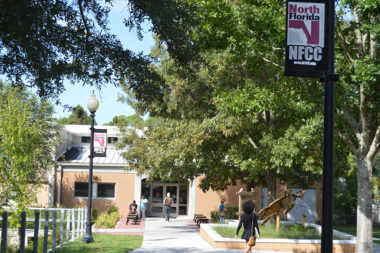 North Florida Community College (NFCC) in Madison, FL, is a Films On Demand subscriber. We recently talked with Lynn Wyche, director of learning resources at NFCC’s Marshall Hamilton Library, about her favorite part of being a librarian as well as how her library handles technophobes and alerts faculty about new resources.
North Florida Community College (NFCC) in Madison, FL, is a Films On Demand subscriber. We recently talked with Lynn Wyche, director of learning resources at NFCC’s Marshall Hamilton Library, about her favorite part of being a librarian as well as how her library handles technophobes and alerts faculty about new resources.
Tell us one way you’re helping users who may be hesitant to embrace technology to take advantage of your library’s online resources.
Technology may be a huge or minimal challenge depending on the student. Since we serve a wide variety of students, one strategy we employ is to offer our library services in a comfortable setting and efficient manner so that all students feel welcome. We work with our faculty and our Academic Success Center (ASC) partners to help students embrace our online offerings through instruction, informational videos, virtual reference, and research guides. It is important to keep faculty in the loop when offering new resources so that they require or strongly encourage the use of these resources in their classes. We also have a very dedicated ASC that actively promotes these resources. Of course, one of our most effective tools is our library orientations. Just yesterday a student commented on a library orientation survey about our Issues and Controversies database and a function that was new to the user. We like when we can connect students to these valuable resources and help them use them effectively.
What is your favorite part of being a librarian?
My favorite part of being a librarian is seeing the moment a student grasps a concept or application. It is so rewarding to know that this moment of learning will not only positively affect their current educational journey but will help them beyond our institution. Adding to the “library legacy” for a user is very gratifying and one that all the librarians I know value.
What do you think is the library’s most important responsibility at your institution?
Our most important responsibility and our mission is to actively support the curriculum and mission of North Florida Community College by providing access to quality learning resources and instructional services. The library promotes the use of electronic resources such as the Films On Demand database, and we seek to provide its users with the competencies necessary to pursue their goals and to become productive members of the community.
How do you alert faculty to the new resources your library acquires?
We like to bring faculty into the procurement process by taking advantage of free trials and collecting their feedback. Most recently, we previewed the Academic eBook Collection. Key faculty members previewed the content and gave me feedback as to the relevancy and potential use of this resource. Several of our faculty members are embracing open resources for their instructional content, and we are always looking for ways to provide these resources in an easy-to-use platform. The library also keeps faculty notified of updates to subscriptions and possible webinars. This not only helps the instructor stay aware of the resource, it gives them the tools to assist students with the resource. Finally, we take advantage of marketing materials provided free by our vendors and supplement them with our own materials.
Tell us how you are making the most out of your library budget in these uncertain economic times.
To date, funding for resources is one of our biggest challenges. We use various tools to measure our ROI. We look at usage data, user surveys, and faculty and program needs as well as resource costs. We are very fortunate in that we have an administration that understands the value of our library and our responsibility to serve students on-campus and remotely with quality resources. We strive to educate our stakeholders in the value of this content and how it can ultimately save our students and the institution money by investing in resources that support OER goals.


